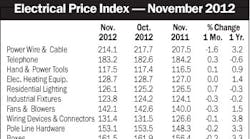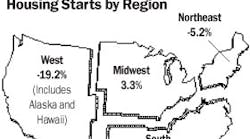It’s been another busy year on the news front in the electrical business. To sort out the companies, people and trends that made news this year, here’s a sneak preview of Electrical Wholesaling’s upcoming article on the 10 biggest news stories of 2004.
PPR to Sell Rexel: No More Pocketbooks and PVC Pipe
In a move that captivated the electrical business around the globe, Rexel SA, the largest electrical distributor on the planet, is expected to be sold by its corporate parent, Paris-based Pinault Printemps Redoute (PPR). PPR is a major player in the retail and fashion industry, with a stable of high-fashion brands that include Gucci, Yves Saint Laurent and Sergio Rossi. The deal is expected to close in first-quarter 2005.
PPR wanted to focus its energies on the world of high fashion instead of pipe and wire, so it plans to divest its 73.45 percent stake in Rexel to a consortium formed by three investment groups: Clayton, Dubilier and Rice (CDR), New York; Eurazeo, a French investment firm; and Merrill Lynch Private Equity, New York.
Internationally, Rexel SA has 1,700 branches and 21,300 employees and approximately $8.2 billion in annual sales. The company’s U.S. division has 280 locations, 4,400 employees and 2003 sales of $1.9 billion. Speculation abounds that the consortium may take the company public in the not-too-distant future.
Worthy Bids Adieu to Sonepar
Five months after hosting a gala bash on the yacht San Francisco Spirit during the NAED Annual Conference to celebrate Sonepar’s USA’s rapid growth to $1 billion in sales, Richard Worthy resigned from his post as the company’s president and CEO in October. It was a wild ride for Worthy. No company has ever grown faster in North America, and there’s no question Worthy was the driving force behind the 29 acquisitions that propelled Sonepar to $1.2 billion in 2003 U.S. sales revenues and $600 million in Canadian sales. Before Worthy came to Sonepar from GE Capital, Sonepar’s lone outpost in North America was in eastern Canada, through the 1984 acquisition of Lumec.
Worthy will be a tough act to follow, but his successor, Tony Burr, has 25 years in Europe’s distribution business. Industry observers wonder if Worthy will one day build a business for another distributor.
Getting Pricey: Steel and Copper Bust Through the Roof
Just how bad are soaring steel prices? Along with driving electrical distributors insane, price increases have really shook up the scrap steel market. According to a recent report in USA Today, prices for scrap steel have more than quadrupled since 2001. Apparently, the huge demand for scrap has touched off an international wave of thefts of anything with a high steel content, according to the USA Today article.
The article said thieves around the world are swiping manhole covers, storm drain grates, light poles, and all things metallic to cash in on skyrocketing scrap-metal prices. More than 150 manhole covers disappeared from alleys in Chicago last month.
The price increases are truly mind-boggling. Copper hit $1.44 per pound on the spot market in November, after averaging 75 cents per pound for the past five years. Prices for steel mill products were up 43 percent in 2004. This year’s historic price increases for steel- and copper-based products will be grist for the war stories that this generation will tell their grandchildren years down the road. Distributors were able to pass along the increases, and many industry insiders agree that these increases did pad the bottom line a bit, although they did inflate overall sales figures for the industry.
What’s in store for 2005? Smith Barney expects copper prices to settle down to an average price of $1.10 per pound in 2005 and 2006. John Mothersole, an analyst with Global Insight, Washington, D.C., says commodity prices are topping out and that the market fundamentals remain sound because the increases were caused by higher demand in the U.S. housing market, a rebound in the European economy and phenomenal Chinese growth.
Market Rebound: 2004 Was Better, But 2005 May Be Great
Once you strip away the price increases that most distributors were able to pass along to their customers because of the increased cost of copper and steel, real growth in the electrical market in 2004 wasn’t all that hot. But the stage may be set for some solid growth in 2005 when the commercial and industrial construction market segments are expected to see some sizeable sales increases.
In last month’s “Market Planning Guide,” Electrical Wholesaling called for a 7.1 percent increase in sales of products sold by electrical distributors in 2005. Herm Isenstein, president, DISC Corp., Orange, Conn., says 2005 growth will be 8.2 percent. Those are encouraging numbers when one figures sales growth in the electrical wholesaling industry averages 4 percent to 6percent per year.
Distributor Acquisitions With a Distinctly Different Twist Relatively few distributor acquisitions were consummated in 2004. However, at least two companies made acquisitions that put them into markets a bit unfamiliar to most electrical distributors.
Early in the year, Hughes Supply Inc., Orlando, Fla., completed its acquisition of Century Maintenance Supply Inc., Stafford, Texas, which focuses on the apartment maintenance, repair and operations (MRO) market by serving national property management companies. In the $360 million acquisition, Hughes acquired 39 new locations in 35 states.
Hughes also made a splash far from its stronghold in the Southeast when it purchased Standard Wholesale Supply Co., a Las Vegas-based distributor of waterworks, plumbing and electrical products. The company’s other 2004 acquisitions were in the more familiar utility market. To build its utility business, which accounts for roughly 11 percent of its total sales, Hughes Supply again looked west and acquired Southwest Power, Sante Fe Springs, Calif., and Western States Electric, Portland, Ore.
Border States Electric Supply, Fargo, N.D., is another fan of expansion far from its traditional markets. Although the company is best-known as a powerhouse of the Dakotas, it also has operations in the Southwest and Mexico, as well as Wisconsin, Minnesota, Montana, Iowa and Michigan.
The company also isn’t afraid to expand beyond the electrical business, and has substantial utility operations in the Midwest and a new interest in the gas and oil market through its recent acquisition of Bates and Associates Inc., Grand Haven, Mich., a 24-year-old distributor of products for the gas and oil markets.
Border States also acquired Miller Electric, Gillette, Wyo., in 2004.
Software Companies for Sale: Have We Only Just Begun? Change is in the air in the business software market. In 2004, the electrical industry saw the purchase of the largest provider of distribution software when Prophet 21 bought TradePower, Blue Bell, Pa. In addition, Infor Global Solutions, Alpharetta, Ga., acquired NxTrend, Colorado Springs, Colo.; and Aperum, Duluth, Ga.
Fasten your seatbelt, because the industry may be in for an even wilder ride over the next few years. Microsoft’s Business Solutions software unit and SAP are planning forays into the electrical world. The call for more efficient handling of digitized product data will up the ante for all software providers. Distributors and their customers are slowly but surely blending online sales into their business processes. It’s not your daddy’s distribution software business anymore.
Rebate Redux: Why Utility Rebates Are For Real (Again)
Utility-rebate programs are back. Utility-rebate programs took the electrical industry by storm in the early 1990s when power companies wanted customers to cut back on power consumption. Offering customers financial incentives was a heck of a lot cheaper than building new power plants.
Rebate programs got a black eye later in the decade because of fraudulent rebate claims and other scams. But blackouts in recent years in some of the nation’s most densely populated metropolitan areas got people thinking again about cutting back on their energy usage. While rebates have had their ups and downs, there’s no question that they can spark sales of more energy-efficient electrical products.
Surviving Storms: Electrical Industry Battered by Hurricanes and One Really Mean Twister
It’s not every day that an electrical distributor must activate the company’s disaster-recovery plan — if there is a plan. Many Florida distributors had to go into emergency mode at least once this fall when three different hurricanes slammed into the state, ripping roofs off distributor facilities and snarling deliveries and communications for days.
Two months after the September storms, signs of damage were everywhere. Blue tarps were still draped over homes, protecting them from water damage; the whine of chainsaws cutting clearing brush and downed trees filled the air; and a church near Winter Park, Fla., stood silent, waiting for a new steeple to replace the one that was blown off during one of the storms.
A thousand miles north, a tornado that was part of the remnants of Hurricane Jeanne had destroyed much of the New Castle, Del., headquarters of United Electric Supply on Sept. 28. Fortunately, Tom Cloud, United Electric’s CEO, and his management team had a detailed disaster-recovery plan to guide the company back to health. The headquarters is being rebuilt, and United Electric’s nearby temporary headquarters is fully operational. The company is even promoting “tornado-tested service” at the temporary branch in that building.
Roll-Ups Unravel: Why Bigger Isn’t Always Better
It looked like a good plan on paper in the late-1990s: Use venture capital to consolidate the fragmented electrical contracting business by buying up smaller electrical contractors to create a national electrical contracting business. It didn’t turn out to be that easy. Consolidators such as Encompass, Bracknell, Quanta Services Inc., and Integrated Electrical Services (IES), did buy dozens of family-owned contracting firms. But by 2005, two of the companies, Encompass and Bracknell, were defunct.
Two of the remaining consolidators have some financial challenges to overcome. IES posted a net loss of $134.4 million in its 2004 fiscal fourth quarter ending Sept. 30. IES also announced that it had sold three of the electrical contracting firms it purchased during the 1990s, and that because of stricter financial requirements of its surety bond provider, it would no longer pursue some large construction projects that require that contractors post larger surety bonds.
Quanta, which focuses on the telecommunications and cable television industries in addition to the electrical construction business, posted a loss of $9.2 million in net income through the first nine months of 2004.
The oldest of the consolidators, Emcor Group Inc., Norwalk, Conn., is still quite profitable. The company’s U.S. electrical construction and facilities services unit, which accounts for 26 percent of the company’s total revenues, logged a $24.3 million profit through the first nine months of 2004.

